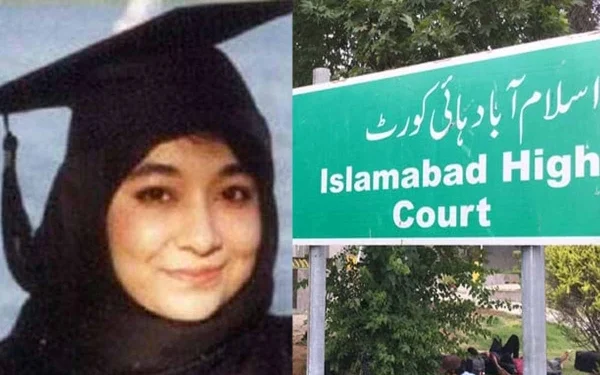Introduction: A High-Profile Case with Global Attention
The case of Dr. Aafia Siddiqui, a Pakistani neuroscientist imprisoned in the United States, has once again taken center stage in Pakistan’s legal and diplomatic discussions. In a recent development, the federal government of Pakistan has refused to become a legal party in the ongoing case related to Aafia Siddiqui’s health and repatriation, which is being heard in a U.S. court.
This revelation came during a hearing at the Islamabad High Court (IHC), presided over by Justice Sardar Ijaz Ishaq Khan, where the court expressed concern over the government’s passive stance and demanded clear reasoning for its refusal to actively participate in the international legal proceedings involving a Pakistani citizen.
Court Proceedings: IHC Questions Government’s Silence
The Islamabad High Court was hearing a petition filed by Dr. Fawzia Siddiqui, sister of Aafia Siddiqui, who has persistently advocated for her sister’s release and return to Pakistan. The petition addresses growing concerns regarding Aafia Siddiqui’s deteriorating mental and physical health and calls for stronger efforts toward her repatriation.
During the hearing, lawyer Imran Shafiq, representing the petitioner, appeared alongside the Additional Attorney General (AAG) and other officials representing the federal government. When questioned about the government’s efforts in Aafia’s case, the AAG stated that the government has decided not to become a party in the U.S. proceedings.
This response did not satisfy Justice Sardar Ijaz Ishaq Khan, who emphasized that state decisions must be based on justifiable reasons, especially in a case involving a Pakistani citizen imprisoned abroad. He remarked, “This is a constitutional court. The government must explain its reasoning. No decision is made without rationale.”
The court has now directed the government to present its reasoning in the next hearing, scheduled for Friday, July 4.
Background: Who is Aafia Siddiqui?
Dr. Aafia Siddiqui is a Pakistani neuroscientist who was arrested in 2008 in Afghanistan and later convicted in 2010 in the United States on charges of attempting to kill U.S. military personnel during interrogation. She was sentenced to 86 years in prison and is currently serving her sentence at the Federal Medical Center (FMC) Carswell, a prison facility in Texas that provides psychiatric care for female inmates.
Her arrest and subsequent trial have been the subject of widespread controversy, both in Pakistan and internationally. Many human rights organizations and political parties in Pakistan have claimed that Aafia was illegally detained, while U.S. officials maintain that she received a fair trial.
Her case remains a symbolic issue in Pakistan, often invoked in political discourse, rallies, and public debates as an example of American injustice and the failure of successive Pakistani governments to protect their citizens abroad.
Government’s Previous Stance and Diplomatic Efforts
Over the years, the Pakistani government has repeatedly expressed concern over Dr. Aafia’s imprisonment and claimed to have raised the issue with American counterparts through diplomatic channels. However, efforts for formal repatriation or prisoner exchange have largely stalled.
Several petitions have been filed in Pakistani courts, requesting the government to:
- Provide legal assistance to Dr. Aafia Siddiqui.
- Negotiate a prisoner swap deal.
- Bring her mental health status to the attention of international human rights organizations.
Despite these appeals, the government has not pursued any legal intervention in the U.S. courts, and the recent statement by the AAG further confirms that no such steps will be taken in the immediate future.
Public and Legal Criticism of the Government’s Refusal
The federal government’s refusal to become a party in the U.S. case has been met with sharp criticism from legal experts, human rights advocates, and members of civil society. Critics argue that:
- The state has a moral and constitutional responsibility to protect its citizens.
- Non-intervention sets a dangerous precedent for future cases involving Pakistanis detained abroad.
- The government’s decision lacks transparency and political will.
Dr. Fawzia Siddiqui, who has been tirelessly advocating for her sister’s release, expressed disappointment in the government’s passive role. She urged the judiciary to hold the executive accountable and called on Prime Minister Shehbaz Sharif and Foreign Minister Ishaq Dar to personally intervene.
Legal and Constitutional Obligations of the State
From a constitutional standpoint, Article 9 of the Constitution of Pakistan ensures the right to life and liberty of every citizen. Legal analysts argue that this extends to Pakistani nationals imprisoned abroad, particularly when there are concerns regarding health, fair trial, and potential human rights violations.
Furthermore, Pakistan is a signatory to international human rights treaties, including the Vienna Convention on Consular Relations, which mandates states to safeguard the rights of their detained citizens in foreign countries.
Justice Sardar Ijaz Ishaq Khan’s remarks during the hearing reflect the judiciary’s view that executive discretion must be explained and justified, especially when such decisions impact a citizen’s life and liberty.
International Reactions and Human Rights Implications
Dr. Aafia Siddiqui’s case has been flagged by several human rights organizations as a matter of concern. Allegations of mistreatment, solitary confinement, and lack of medical care have been reported by legal teams and advocacy groups.
Organizations like Amnesty International and the Center for Constitutional Rights have highlighted the opaque nature of her arrest and conviction. These concerns raise questions about due process, mental health rights, and prisoner treatment standards under international law.
Pakistan’s decision to stay silent in the legal process may be seen internationally as abdication of its responsibility, affecting the country’s standing in future diplomatic negotiations on human rights and extradition matters.
What Happens Next?
The Islamabad High Court has now asked the federal government to submit detailed reasons for not joining the U.S. legal proceedings in the next hearing. This response is likely to determine whether the court will:
- Issue a directive to the government to reconsider its decision.
- Recommend diplomatic or legal alternatives.
- Continue judicial oversight of the government’s actions in the matter.
Meanwhile, the petitioner’s legal team may also pursue international legal assistance frameworks, depending on the outcome of the July 4 hearing.
Conclusion: A Case That Continues to Haunt Pakistani Conscience
The case of Dr. Aafia Siddiqui remains one of the most emotionally charged legal matters in Pakistan. It highlights the complex interplay between international diplomacy, national security, human rights, and constitutional responsibility.
With the government’s latest refusal to engage legally in the U.S., questions are being raised not only about Aafia’s fate but also about the state’s willingness to stand by its citizens under difficult international circumstances.
As the July 4 court date approaches, all eyes are on the Islamabad High Court, which may push the government toward a more proactive and transparent role in this deeply controversial and long-standing case.

























